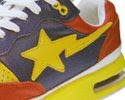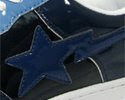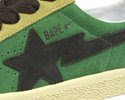Following 30 years of economic reforms, China has achieved remarkable success in economic development. Now few economists and marketers doubt that China will evolve into a nation of spenders. Along with the rising of income level, the purchasing power of Chinese consumers has been increasing rapidly. Clothing expenditures have also been growing fast. The retail sales of China market in 2007 reached US $ 2970 billion with clothing's contribution of US $ 150 billion, according to official figures by National Statistics Bureau. Kurt Salmon Associates forecast that by 2020 total clothing consumption of China will be about 120 of Japan. It is this market perspective that has attracted many overseas investors. Many international clothing manufacturers and retailers are increasingly viewing China as a huge potential market.
Bape Hoodies and Shoes
However, the apparel market is very competitive and challenging both in manufacturing and in retailing. To conduct effective marketing, it is necessary to understand the consumption patterns of the people, and important to have appropriate market segmentation. Some research has been reported in the literature. For example,Gallup conducted a geographic analysis and suggested that in China the urban market was much more important than the rural one. Urban residents have higher income and hence higher purchasing power, and are more sophisticated than the rural people. Cities trend setters and testing grounds for future marketing strategies. On the other hand, demographic analysis indicated that the most promising consumer segment in China was the young people. It was also found that the younger consumers (aged 15-35) had more experience with western products, compared with the older ones (aged over 35). Regarding the influence of gender, it was reported that young women were least concerned about price.And they love the clothing such as bape hoodies, bape shoes, lrg hoodies, 10 deep hoodies, ed hardy hoodies etc.

In order to touch the most active clothing consumers, a questionnaire was designed for respondents aged 15 to 45. Questionnaire survey was carried out in six cities of China, including Beijing, Shanghai, Guangzhou, Chengdu, Harbin and Xi'an. These are among the largest cities in China, and are relatively evenly distributed geographically: Beijing in the North, Shanghai in the East, Xi'an in the Northwest, Chengdu in the Southwest, Guangzhou in the South, and Harbin in the Northeast. They are the most important cities in each of the regions respectively in terms of economic and societal life, and are regarded as fashion centers of die region. These cities are considered to be very influential in patterns of consumption for other cities in China, thus an investigation of clothing consumption may give a good indication not only of the current situation, but also future trend for the entire nation.
From the analysis, we can conclude that the clothing expenditures of Chinese urban consumers are increasing rapidly along with the development of China's economy. And, how much money the Chinese consumers are able to and willing to spend on clothing tends to be influenced by several factors that originate in social, culture and economic forces. The geographic differences in clothing expenditures are found significant. Significant demographic and socioeconomic influential variables include age, gender, marital status, education level, occupation and household income. Furthermore, the interactive effects of geographic location with age, gender and occupation have significant influence on clothing expenditures. It is believed that the era of "one style fit all" has been history and the Chinese consumers are never largely homogeneous. For example some young people like bape hoodies, bape shoes, lrg hoodies, 10 deep hoodies, ed hardy hoodies etc. It is important that apparel manufacturers and retailers investigate the effects of the determining factors on clothing expenditures and make effective segmentation marketing strategies.






No comments:
Post a Comment